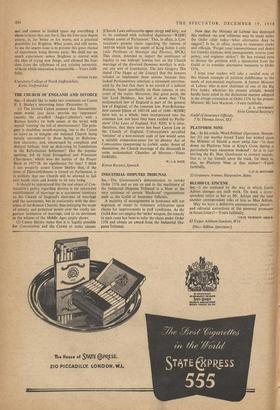THE CHURCH OF ENGLAND AND DIVORCE SIR,—I should like to
make two comments on Canon F. J. Shirley's interesting letter (December 5).
(1) The learned Canon assumes that Disestablish- ment would, ipso facto, provide my 'opponents' (mainly the so-called 'Anglo-Catholics') with a Roman holiday (in both senses of the term), with myself 'starring' the bill of entertainment! The pros- ' pect is doubtless mouth-watering, but is the Canon so naive as to imagine our national Church being tamely surrendered to those hating its Reforma- tion character, and, encouraged by compliant and disloyal biShops, bent on destroying its foundations in the Reformation Settlement? Has the popular uprising, led by loyal Evangelical and Protestant Churchmen, which won the battles of the Prayer Book in 1927-28, no significance for him? I think I can properly assure Canon Shirley that, if the issue of Disestablishment is forced on Parliament, it is unlikely that our Church will be allowed to fall into hands alien and hostile to its very being.
It should be appreciated that the real object of Con- vocation's policy regarding divorce is the subversive establishment of marriage as a sacrament (contrary to the Church of England's doctrines of marriage and the sacraments, but in conformity with the doc- trines of the Roman Church), thus enlarging the scope of priestly and prelatical power over the vitally im- portant institution of marriage, and to its detriment as the witness of the Middle Ages amply shows.
(2) Canon Shirley states that it is 'legally possible for Convocation and the Crown to make canons
[Church Laws enforceable upon clergy and laity; not to be confused with cathedral dignitaries—WJSW] without assent of Parliament.' This, in effect, is Con- vocation's present claim regarding the canons of 1603-04 which had the assent of King James I only (vide Problems of Marriage and Divorce, SPCK). This claim, intended to impart the semblance of legality to our bishops' lawless ban on the Church marriage of the divorced (however worthy), is with- out any sort of foundation. The late Gregory Dix stated (The Shape of the Liturgy) that the lawyers refused to implement these canons because they lacked Parliamentary sanction; a statement corrobor- ated by the fact that there is no record of a judicial decision, based specifically on these canons, in any court of the realm. Moreover, that great jurist, the late Lord Halsbury, has laid it down that 'The ecclesiastical law of England is part of the general law of England, of the common law. Post-Reforma- tion canons [those of 1603-04 and of 1640—W1SW] have not, as a whole, been incorporated into the common law, nor have they been ratified by Parlia- ment' (The Laws of England, Vol. XIII). It is clear, therefore, that there never has been Canon Law in the Church of England. Convocation's so-called 'revision' of a non-existent code of law would seem a suitable companion-piece for its phoney Act of Convocation (purporting to forbid, under threat of damnation, the Church marriage of the divorced) in some ecclesiastical Chamber of Horrors.—Yours faithfully,

























 Previous page
Previous page